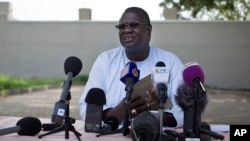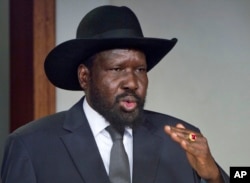The rift between South Sudan's President Salva Kiir and former deputy Riek Machar has deep roots that reach back to the period before the nation's creation in 2011.
Analysts say a number of factors have contributed to the current tensions that have led to an escalation of violence in South Sudan.
If you want to get to the core of the friction between Kiir and Machar, you have to go back at least five years.
So says Jok Madut Jok, the head of the Sudd Institution, a South Sudan think tank.
Jok says the tensions began when Machar started envisioning himself as a more fitting leader in what was then the semi-autonomous region of southern Sudan. He says the deputy would attempt to undermine Kiir.
"Sometimes there would be agreement on issues or programs to be implemented and the vice president, being the top administrator in the country, would sometimes fail to implement what has been agreed upon," he said.
Both men kept their leadership positions in the ruling party, the Sudan People's Liberation Movement (SPLM), when the country gained independence in 2011.
Jok says Machar and some of the other party members became more openly critical of Kiir after he dismissed them in a July 2013 Cabinet purge.
"President Kiir had been accused extensively by a number of people that he fired back in July, including the former vice president, that he had been heavy-handed and undemocratic and developing dictatorial tendencies," he said.
Kiir and Machar fought side-by-side during the north-south conflict but, at some points, they also fought against each other.
Machar, at one point, moved out of the Sudan People's Liberation Army. He formed a splinter group composed mostly of ethnic Nuers.
Forces loyal to Machar were blamed for a 1991 massacre of ethnic Dinkas in the town of Bor.
Akshaya Kumar is a South Sudan policy analyst with the Enough Project, a group that fights to end genocide and crimes against humanity. She says a lot of the current tension between Machar and President Kiir, a Dinka, date back to this incident.
"President Kiir has been drawing on those memories and referencing them, even in his public statements," Kumar said. "So, we know that that is something that is certainly salient on his mind as well as the minds of many other South Sudanese."
Machar has publicly apologized for any role in the Bor massacre. Kumar says the two men initially tried to put their differences behind them to form a unity government.
"Riek Machar was brought in as vice president for the new South Sudan with the hope that he would be able to bring his significant power and constituency, both military and political, to the table to ensure that there would be a more cohesive national governing force," she said.
But the government's unity attempt has faltered. On VOA's Press Conference USA John Campbell, who is a veteran U.S. diplomat who is now at the Council on Foreign Relations, said it appears individual agendas have replaced unity.
"Very often, behind ethnic conflict, you will find various political figures that seek to exploit ethnic identities in order to advance their own particular political agenda," he said. "And, I think there is at least some of that underway now in South Sudan."
Ahmed Soliman, a Horn of Africa researcher at London's Chatham House, says Kiir's current problems with leadership have evolved beyond his rift with Machar and now reflect the changing nature of the government.
"An opening up of the party to enable challenges within the leadership would always, I think, entail some conflict. And, we may be seeing some of that now," he said.
Soliman says South Sudan's leadership is also beginning to feel the pressures of generational change, which may include moving away from the military-style leaders who ushered the nation into existence.
Analysts say a number of factors have contributed to the current tensions that have led to an escalation of violence in South Sudan.
If you want to get to the core of the friction between Kiir and Machar, you have to go back at least five years.
So says Jok Madut Jok, the head of the Sudd Institution, a South Sudan think tank.
Jok says the tensions began when Machar started envisioning himself as a more fitting leader in what was then the semi-autonomous region of southern Sudan. He says the deputy would attempt to undermine Kiir.
"Sometimes there would be agreement on issues or programs to be implemented and the vice president, being the top administrator in the country, would sometimes fail to implement what has been agreed upon," he said.
Both men kept their leadership positions in the ruling party, the Sudan People's Liberation Movement (SPLM), when the country gained independence in 2011.
Jok says Machar and some of the other party members became more openly critical of Kiir after he dismissed them in a July 2013 Cabinet purge.
"President Kiir had been accused extensively by a number of people that he fired back in July, including the former vice president, that he had been heavy-handed and undemocratic and developing dictatorial tendencies," he said.
Kiir and Machar fought side-by-side during the north-south conflict but, at some points, they also fought against each other.
Machar, at one point, moved out of the Sudan People's Liberation Army. He formed a splinter group composed mostly of ethnic Nuers.
Forces loyal to Machar were blamed for a 1991 massacre of ethnic Dinkas in the town of Bor.
Akshaya Kumar is a South Sudan policy analyst with the Enough Project, a group that fights to end genocide and crimes against humanity. She says a lot of the current tension between Machar and President Kiir, a Dinka, date back to this incident.
"President Kiir has been drawing on those memories and referencing them, even in his public statements," Kumar said. "So, we know that that is something that is certainly salient on his mind as well as the minds of many other South Sudanese."
Machar has publicly apologized for any role in the Bor massacre. Kumar says the two men initially tried to put their differences behind them to form a unity government.
"Riek Machar was brought in as vice president for the new South Sudan with the hope that he would be able to bring his significant power and constituency, both military and political, to the table to ensure that there would be a more cohesive national governing force," she said.
But the government's unity attempt has faltered. On VOA's Press Conference USA John Campbell, who is a veteran U.S. diplomat who is now at the Council on Foreign Relations, said it appears individual agendas have replaced unity.
"Very often, behind ethnic conflict, you will find various political figures that seek to exploit ethnic identities in order to advance their own particular political agenda," he said. "And, I think there is at least some of that underway now in South Sudan."
Ahmed Soliman, a Horn of Africa researcher at London's Chatham House, says Kiir's current problems with leadership have evolved beyond his rift with Machar and now reflect the changing nature of the government.
"An opening up of the party to enable challenges within the leadership would always, I think, entail some conflict. And, we may be seeing some of that now," he said.
Soliman says South Sudan's leadership is also beginning to feel the pressures of generational change, which may include moving away from the military-style leaders who ushered the nation into existence.





